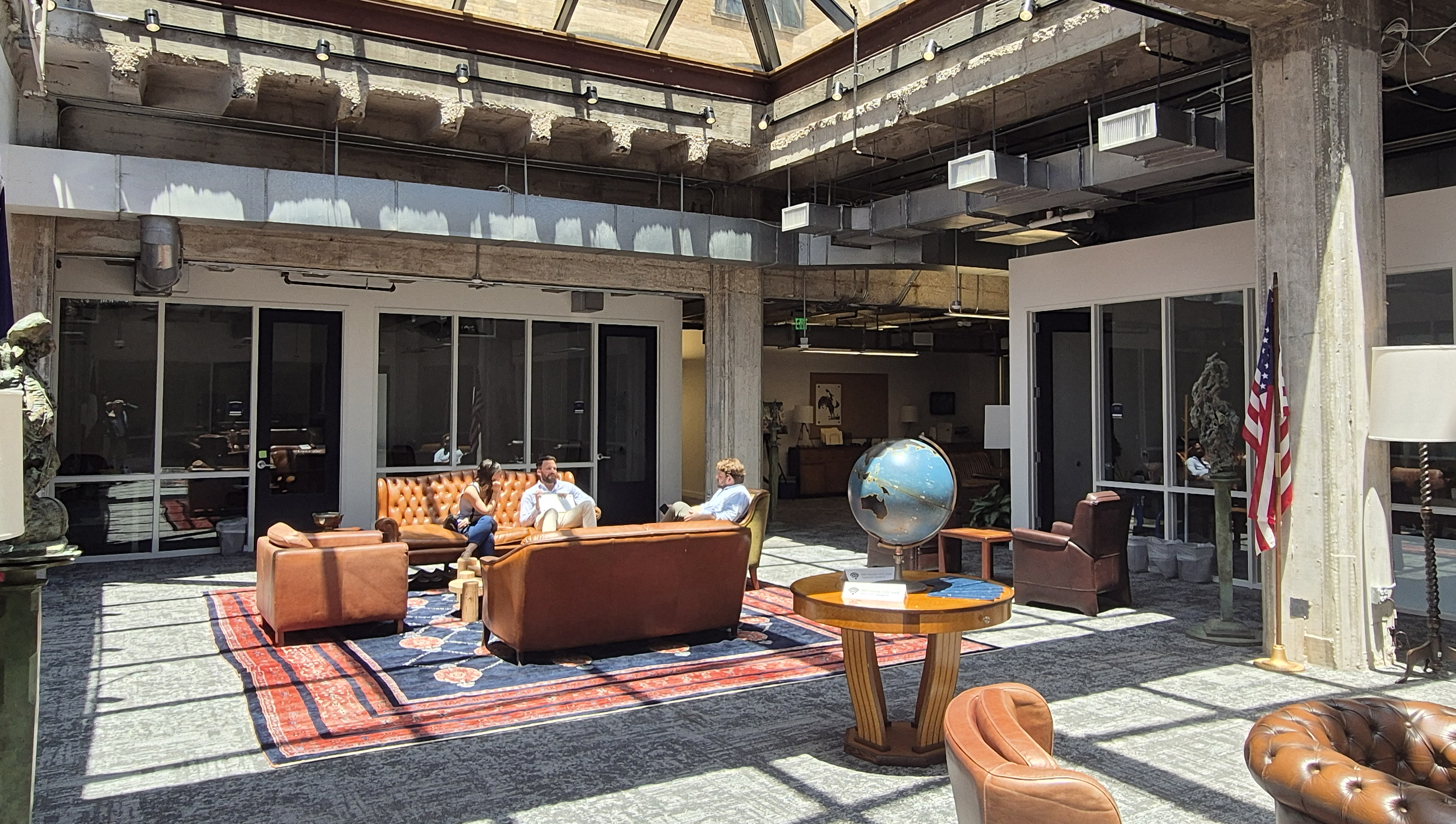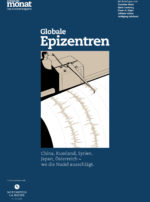«Universities have become ideological instruments for government policy»
Universities have replaced the search for truth with activism. Jacob Howland wants to counteract this with the newly founded University of Austin.

Lesen Sie die deutsche Version hier.
The University of Austin (UATX) is located in the heart of downtown Austin on Congress Avenue, which leads directly to the Texas State Capitol. Everything here looks more like a startup than a university, but they make an effort to appear as a university with tradition: If you grab a book from the library and sit down on one of the Chesterfield sofas and look over the collection of globes, you might think for a moment that you are in old England, for example in Cambridge.
Jacob Howland, how did you decide to come to this very special university?
In 1988, I became a professor at the University of Tulsa, Oklahoma, I enjoyed three wonderful decades with excellent students. The University of Tulsa was a major institution, we were in the top 100 universities in the United States, according to the ratings of US News and World Report. But in April of 2019, the university was taken over by a left-wing billionaire named George Kaiser. His people eliminated forty percent of the academic programs, mostly in the humanities. They claimed that there was financial exigency, which was false.
What did they do?
They took out almost all the music programs, got rid of the theater program and almost all the languages, including Greek and Latin. And they got rid of the department I had built of philosophy and religion. They transferred resources to applied science, cybersecurity in particular. In 2021, the formation of the University of Austin was publicly announced. At the same time, the people who set up the university reached out to me and asked if I was interested in considering a position here. I started in April 2022.
I always thought that left-wing people are in favor of the humanities. Is this not the case?
My best understanding is that this doesn’t have anything to do with politics, but with greed. George Kaiser wanted to turn Tulsa into what he called the cybersecurity capital of the world. Kaiser had a plan as early as 2010 to develop businesses, he wanted to shift training costs to the university. In other words, if the university focuses on cybersecurity and prepares a bunch of employees and managers, then they can go directly into this industry.
Universities were founded to find the truth, and your university pursues this end. Do other universities in the US not share this goal anymore?
Politics and ideology have invaded the universities, a problem that’s found in all English-speaking countries, especially in Canada. The old-fashioned conception of universities was – and this is really what universities are and are supposed to be – that they are communities where one seeks the truth, and where education takes place. Education itself is the transmission of the wisdom and knowledge that has been accumulated in the past, and the extension and development of knowledge. That includes the transmission of essential knowledge and wisdom from generation to generation. At some point in the last four decades, the conception of university teaching turned in the direction of political activism. The idea was, as Marx wrote, that the point is not to know the world, it’s to change it. This kind of soft Marxism invaded the universities.
«Politics and ideology have invaded the universities.»
Do you have examples of this?
If you want to do research into the natural, sexual differences between males and females, you’re not going to get very far at university, because this runs afoul of gender identity and transsexuality. If you want to investigate questions of intelligence between different ethnic groups, this would be forbidden. If you want to take a stance on climate change, this goes against the orthodoxy of the United Nations and other organizations. These universities and organizations assume they already know the truth, and governments are working with them. For example, The U. S. National Science Foundation gives money to universities to study how to censor material on the internet. They were very active during Covid; if anybody said that this virus came from a laboratory in China, this would be cut down. Universities have, therefore, become ideological instruments for government policy.
What kind of alternative to this do you provide?
We simply want to provide an environment in which students and teachers can once again seek the truth, without worry, without the pressure to conform to popular opinions, without the concern that faculty might be fired because of their heterodox opinions. Students need to feel that they can speak freely in the classroom. This is a big problem because every single poll I’ve seen shows that the majority of faculty and students, pretty much across the board, have censored themselves, because they’re afraid of the consequences of not adhering to the ‘correct’ opinions.
How is the representation of Democrats and Republicans at your university?
Let me start with the students. We don’t know what their politics are. In fact, we have a constitution which says that when we admit students, we cannot take their race, their sexual orientation, their politics, their religion, anything like that into account. I am very certain that they come from across the political spectrum, and not necessarily in equal numbers. This is just because they come from different backgrounds.
And the professors?
We do have professors here who are explicitly left-leaning, but not as many as the number who are on the right or center-right. It’s an issue for us because we want a real mixture and a kind of balance. The reason we want that is not because we want to project a certain political identity. It’s because diversity of political position is a marker – not always a completely accurate one – of diversity of intellectual positions. If among the faculty of Harvard University the ratio of Democrats and Republicans is something like 80 or 90 to 1, I can tell you with great confidence the kinds of positions that are probably not represented at that university.
«It’s because diversity of political position is a marker – not always a
completely accurate one – of diversity of intellectual positions.»
What’s the underlying problem?
The problem is that the university and higher education as a whole have become very much left-wing. People who are already in academia tend to be very suspicious of us. Because we said from the beginning that we don’t want ideology in the classroom and be neutral. That is understood by many to mean that we are on the right. Our dean of the Center for economics, politics, and history, has co-authored a number of books and articles with someone on the left. We like that kind of approach, because it makes for better social science, it makes you frame questions in different ways. I’ve been pleased to see that quite a few people have applied, been interviewed, and some have been hired, who say they’re on the left.
It’s difficult to apply to the University of Austin as a student. Why?
First of all, it’s very difficult to start a new university. There is what the economists call regulatory capture. In the state of Texas you have to be authorized as a new university, and once you achieve authorization, you have seven years to be accredited. And before you are accredited, you cannot do a number of things. We’re not allowed to use the Common Application. We cannot accept transfer students from other universities. We cannot receive federal financial aid for families who have some financial need. Furthermore, we cannot be accredited until we graduate our first class of students. So, our first class will be graduating from a university that is not accredited. That means that there are law schools, medical schools or graduate schools that will not consider them because they ask for a graduation from an accredited institution. All these barriers mean that it is much riskier for an undergraduate to start at our university than it is at an established one.
In that case, you only had a few applications?
We haven’t had a huge number of applications, but the students are self-selected and they tend to be risk-takers. In order to apply you have to write two special essays for us, and you have to take a standardized exam, like a SAT or an ACT. Since 2020, when George Floyd died, universities have gotten rid of the standardized exam. The Ivy League universities are only now going back to such exams because getting rid of them didn’t work. But still, roughly eighty percent of all the colleges and universities in this country do not require a standardized examination.
What would you do if your students become political and start holding anti-Israel protests at your university?
Let me distinguish several things. First, there’s something called academic freedom. Then there’s something called free speech, which is protected by the First Amendment and free expression. But expression is not the same as speech. Here’s an example: If I get up right now and scream “Ahhh!”, that’s expression, but it’s not speech, because speech is articulate. Meanwhile, free speech is not the same as academic freedom. The First Amendment gives you the right to take the telephone book and stand in a public park and read that book in a loud voice. But you don’t have the right to do that in a class.
What are you free to do at your university?
Universities are about teaching and learning, the preservation, transmission and extension of knowledge. Those are the things you have the freedom to do there and they’re not allowed to be infringed. Outside of the classroom, you do have free speech. In other words, if students at a university want to stand on the grass outside of a building and say they support Palestine, they have the right to do so. That in itself is not interfering with academic freedom. If, however, you have a group of students in a in a space on the campus, who say “this zone is not for Jews nor for Zionists,” which has happened, or if they’re occupying and blocking access to university buildings, that’s violating academic freedom. The same applies if they come into a classroom and interrupt the class and say “This teacher is Jewish”, or if they interrupt a professor and prevent a visiting speaker. Your free speech ends when you begin to attack the conditions of teaching and learning at a university.
Could you explain to me, what the term «woke» means?
We try to avoid this term because it is a marker that signifies that those who use it are taking a political position. We want to separate ourselves from political positions. But we can call «woke» identity authoritarianism.
Why?
It’s very focused on group identity. What matters to the woke is not you as an independent, reflective, active individual, but primarily about your station within social power relations. So you, for example, are a white male. Therefore, according to the woke, you are significantly privileged as compared to a black female. The philosophy of woke says that society and politics is really a bunch of power relations that tend to be zero sum. Woke is authoritarian because the people who hold those positions are pursuing a political agenda and so are not interested in a discussion or a debate that is aimed at examining basic presuppositions and finding the truth. At its extreme, woke resembles something like Leninism, which says that the only thing I need to know about you is whether or not you support the Communist Party. And if the answer is no, then you are my enemy and I can shut you down.
So, were the German national socialists woke?
Based on what I have said, the answer is yes, they were identity authoritarians.
Is the Judeo-Christian heritage really necessary for our civilization to flourish or can we reach the same beneficial conclusions or outcomes in a more secular or Kantian way?
Could you fully understand Kant if you did not understand the religious and philosophical background he was writing in and about? What Kant is trying to say is that there is a purely rational basis for a morality that initially was delivered and disseminated in the form of Revelation. I don’t think we can uphold Western civilization by just starting with Kant and basing everything on a rational understanding of morality. We live in communities that essentially have that kind of Judeo-Christian basis. It’s an open question whether democratic republics can flourish in the absence of something like a political theology.
What is the West in your eyes?
I would look at the West as something like a great tree with deep roots. Homer and other ancient epics, and the Hebrew Scriptures, are part of our foundational roots. A classic is a work that has shown its fruitfulness by generating many other books, paintings, musical compositions, and that has shaped lives and deeds over many generations. Interestingly, there are people around today who don’t realize that they are living out a kind of script or a sense of history that actually has its origins in Christianity. To understand Western modernity, we need to see that it is a self-conscious rejection of the authority of the ancients, of the bible in particular. Eventually, these texts lost their authority. This rejection includes the negation of the idea that the universe is intrinsically good.
How do you think your university will turn out in the next ten years?
In ten years, I want us to be known as a place where employers say, «Oh, you’ve got a degree from the University of Austin, we’re hiring you».











